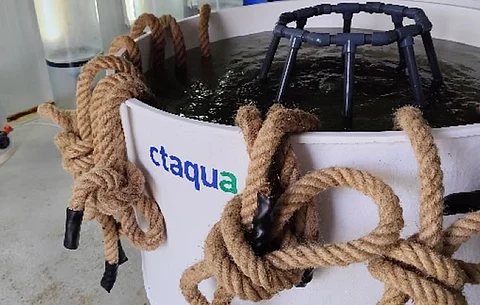This initiative is part of the European project 'NOVAFOODIES'.
Centro Tecnológico de Acuicultura, CTAQUA.
Spain promotes macroalgae cultivation in open-sea facilities
The Andalusia Aquaculture Technological Center (CTAQUA) has started a new trial focused on the industrial scaling of Codium taylorii macroalgae cultivation in the salt flats of the Bay of Cádiz, Spain.
Through the evaluation of the behavior and growth of this seaweed in the marine environment, optimal cultivation conditions can be defined to promote its commercial production.
CTAQUA has already conducted initial work on optimizing cultivation techniques in the salt flats of the Bay of Cádiz with the species Chondracanthus teedei, Codium taylorii, and Ulva ohnoi.
"In this new phase, we have started the fixation of Codium on thicker ropes (30 mm), to transfer them soon to the open-sea facilities of Luace Sostenible, a company dedicated to oyster farming, located in Conil," explained the head of CTAQUA's algae cultivation unit, Manuel Macías.
This initiative is part of the European project 'NOVAFOODIES', which aims to promote innovative solutions based on marine biomass and food chain by-products, while driving new sustainable value chains to protect ecological and cultural assets.
"The use of existing aquaculture infrastructures, such as salt flats and marine mollusk nurseries, represents a commitment to the circular economy and productive diversification, integrating macroalgae cultivation with traditional activities such as salt extraction and extensive aquaculture," explained Macías at the latest consortium meeting in Cork, Ireland.


